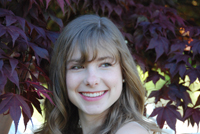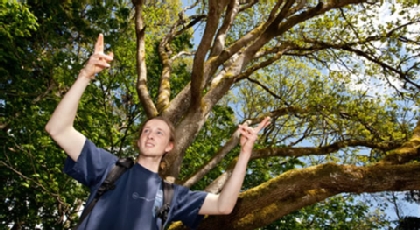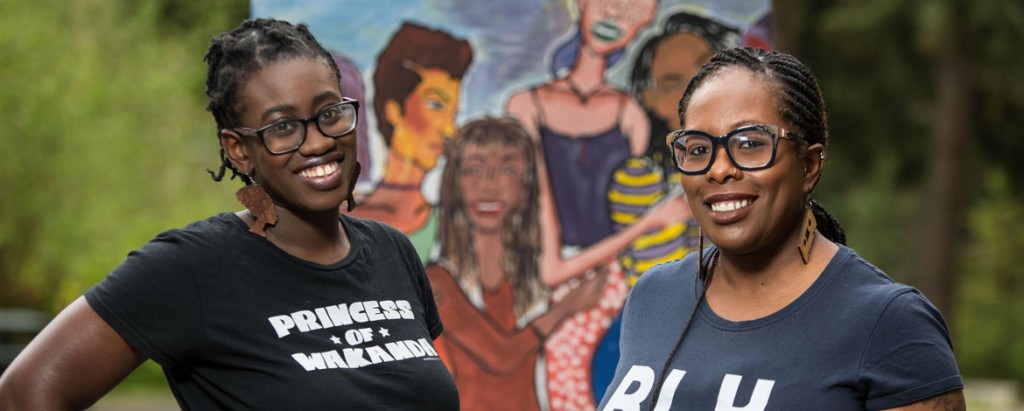Page 45 • (466 results in 0.06 seconds)
-

enrolled. “PLU helped me re-embrace my culture and not see my profession in the stereotypical way of me being the outsider in this rich, white, professional world. When I got to PLU, it wasn’t like everything was against me, it was like, ‘Why not? I’ve already come this far, so why not add this class, why not do this,’ ” she says. Since graduating, she has been working as a medical scribe at a local dermatology clinic. After her Fulbright trip concludes next fall, she plans to begin applying to medical
-
work in the two remarkable faculty-student research projects in the Department of Languages and Literatures, “Chai-na” and “Jean-Jacques Rousseau, Reader of Gabrielle Suchon?”, which have been generously funded by Kelmer-Roe fellowships and the Wang Center for Global Education. And what about you? Has the learning of a language somehow surprised and changed your life? Perhaps learning a language changed the way you understood your own past, culture, or ideas. Perhaps it provided the means to bring
-

seemed so happy! I loved the smiling faces and caring nature of everyone I interacted with. My PLU experience: While my academic and career goals haven’t really changed since coming to PLU, I have grown into someone quite different from the girl I was four years ago — a considerably more confident young woman. Much of this I attribute to IHON. The first course in the program made me critically evaluate my core beliefs — something I hadn’t anticipated. Through IHON, the culture of PLU, and studying
-

China as you pursue your master’s? I’m applying to music schools in China so I can be immersed in the Chinese language and still continue my studies in piano. I am interested in Chinese interpretation work, and of course I want to continue teaching and playing piano—that is a lifelong gift. I am also interested in continuing research on my senior project, called “The Evolution of Piano Pedagogy and Culture in China.” What are your other plans and hopes for the future? Besides using piano and Chinese
-

his hands dirty. After his experiences at PLU, he’s not sure if there’s any other way to learn. He hopes the environmental work he’s done carries on to the next generation of students. There’s still a lot to be done. The work is never over, he said. “I’m hoping it will become more of a campus culture,” he said. “I’m hoping we can be better stewards of pieces of nature we have left. Good stewards recognize the impact we have on the environment.” Today, evidence of that stewardship is taking root at
-

process myself. It was definitely tough. The high school I attended is not the most college-minded culture, so going back lets me show that I got a bachelor’s degree, and say to other students, ‘Hey, you can do this.’” Being able to be one of my only friends who came back to serve the Federal Way community that I got so much from fulfils me every day. What is it like to watch the students you help admit grow through their PLU experience? It’s great when we can find students that we know are awesome
-

pandemic on their communities, and their students and their families. They are also juggling the unknown — they don’t know whether or not they will be returning to their classrooms this school year. I know from my own experience how much work it takes to build the culture for online learning and to implement digital instructional strategies, let alone try to do it all in one week or less. It’s like my teachers are trying to build a dam without instructions while water is flowing, and they don’t have
-
family fled postwar Vietnam when the artist was four years old. A group of friends and neighbors led by Vo’s father left their native country in a handmade boat, hoping to find eventual refuge in the United States. After being rescued at sea by a Danish shipping freighter, Vo and his family settled in Denmark. Vo uses various strategies to analyze the structures and processes that shape our identities, such as the American Dream, capitalist culture, civic bureaucracy, colonial history, migration, and
-

officials), and the Board of Regents approved the degree during its Feb. 6-7 meeting “in recognition of King Harald’s long record of distinguished service to his country and the world.” The nomination also recognized that HM King Harald: • represents PLU’s historic origins and foundational culture as the first prince born on Norwegian soil in 567 years; • promotes the Lutheran tradition of higher education at home and abroad through his record of distinguished service to his country and visits to
-

spaces. “Hair is a really important piece of our culture and who we are, and it’s an interesting piece to navigate when you’re also at a predominantly white institution,” said Taiwo, outreach and prevention coordinator in the Center for Gender Equity at Pacific Lutheran University. So, Taiwo and Hambrick — assistant vice president for diversity, justice and sustainability — decided to uplift the experiences of black students at predominantly white institutions (PWIs) who wear their natural hair. In
Do you have any feedback for us? If so, feel free to use our Feedback Form.


